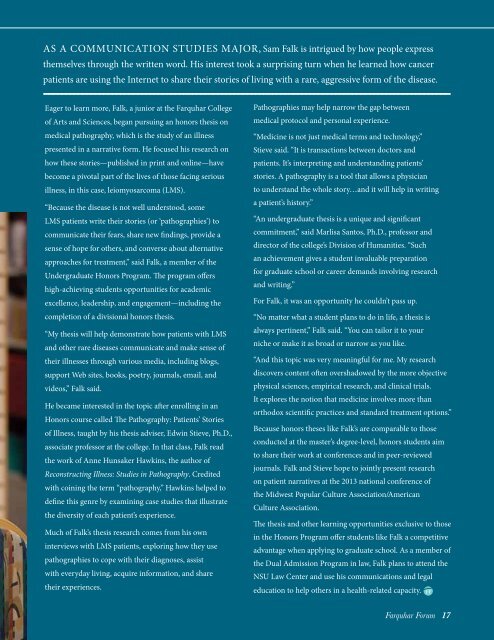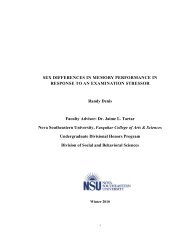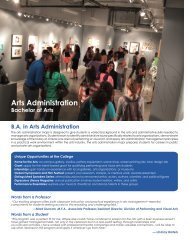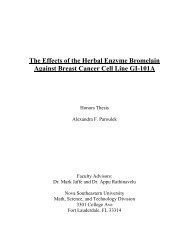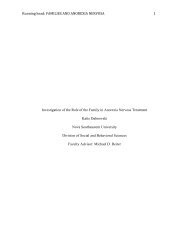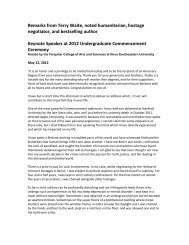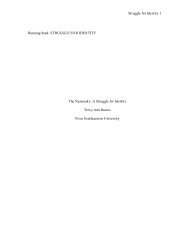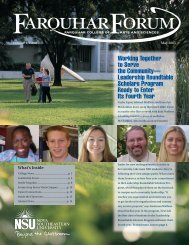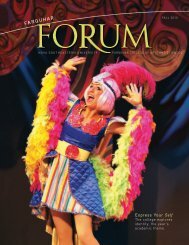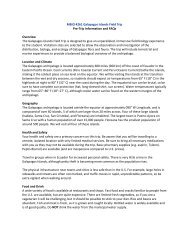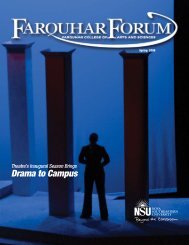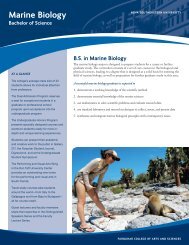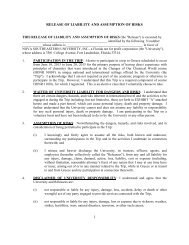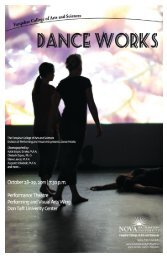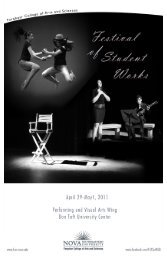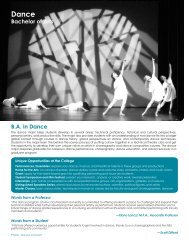2012â2013 - College of Arts and Sciences - Nova Southeastern ...
2012â2013 - College of Arts and Sciences - Nova Southeastern ...
2012â2013 - College of Arts and Sciences - Nova Southeastern ...
Create successful ePaper yourself
Turn your PDF publications into a flip-book with our unique Google optimized e-Paper software.
As a communication STUDIES major, Sam Falk is intrigued by how people express<br />
themselves through the written word. His interest took a surprising turn when he learned how cancer<br />
patients are using the Internet to share their stories <strong>of</strong> living with a rare, aggressive form <strong>of</strong> the disease.<br />
Eager to learn more, Falk, a junior at the Farquhar <strong>College</strong><br />
<strong>of</strong> <strong>Arts</strong> <strong>and</strong> <strong>Sciences</strong>, began pursuing an honors thesis on<br />
medical pathography, which is the study <strong>of</strong> an illness<br />
presented in a narrative form. He focused his research on<br />
how these stories—published in print <strong>and</strong> online—have<br />
become a pivotal part <strong>of</strong> the lives <strong>of</strong> those facing serious<br />
illness, in this case, leiomyosarcoma (LMS).<br />
“Because the disease is not well understood, some<br />
LMS patients write their stories (or ‘pathographies’) to<br />
communicate their fears, share new findings, provide a<br />
sense <strong>of</strong> hope for others, <strong>and</strong> converse about alternative<br />
approaches for treatment,” said Falk, a member <strong>of</strong> the<br />
Undergraduate Honors Program. The program <strong>of</strong>fers<br />
high-achieving students opportunities for academic<br />
excellence, leadership, <strong>and</strong> engagement—including the<br />
completion <strong>of</strong> a divisional honors thesis.<br />
“My thesis will help demonstrate how patients with LMS<br />
<strong>and</strong> other rare diseases communicate <strong>and</strong> make sense <strong>of</strong><br />
their illnesses through various media, including blogs,<br />
support Web sites, books, poetry, journals, email, <strong>and</strong><br />
videos,” Falk said.<br />
He became interested in the topic after enrolling in an<br />
Honors course called The Pathography: Patients’ Stories<br />
<strong>of</strong> Illness, taught by his thesis adviser, Edwin Stieve, Ph.D.,<br />
associate pr<strong>of</strong>essor at the college. In that class, Falk read<br />
the work <strong>of</strong> Anne Hunsaker Hawkins, the author <strong>of</strong><br />
Reconstructing Illness: Studies in Pathography. Credited<br />
with coining the term “pathography,” Hawkins helped to<br />
define this genre by examining case studies that illustrate<br />
the diversity <strong>of</strong> each patient’s experience.<br />
Much <strong>of</strong> Falk’s thesis research comes from his own<br />
interviews with LMS patients, exploring how they use<br />
pathographies to cope with their diagnoses, assist<br />
with everyday living, acquire information, <strong>and</strong> share<br />
their experiences.<br />
Pathographies may help narrow the gap between<br />
medical protocol <strong>and</strong> personal experience.<br />
“Medicine is not just medical terms <strong>and</strong> technology,”<br />
Stieve said. “It is transactions between doctors <strong>and</strong><br />
patients. It’s interpreting <strong>and</strong> underst<strong>and</strong>ing patients’<br />
stories. A pathography is a tool that allows a physician<br />
to underst<strong>and</strong> the whole story…<strong>and</strong> it will help in writing<br />
a patient’s history.”<br />
“An undergraduate thesis is a unique <strong>and</strong> significant<br />
commitment,” said Marlisa Santos, Ph.D., pr<strong>of</strong>essor <strong>and</strong><br />
director <strong>of</strong> the college’s Division <strong>of</strong> Humanities. “Such<br />
an achievement gives a student invaluable preparation<br />
for graduate school or career dem<strong>and</strong>s involving research<br />
<strong>and</strong> writing.”<br />
For Falk, it was an opportunity he couldn’t pass up.<br />
“No matter what a student plans to do in life, a thesis is<br />
always pertinent,” Falk said. “You can tailor it to your<br />
niche or make it as broad or narrow as you like.<br />
“And this topic was very meaningful for me. My research<br />
discovers content <strong>of</strong>ten overshadowed by the more objective<br />
physical sciences, empirical research, <strong>and</strong> clinical trials.<br />
It explores the notion that medicine involves more than<br />
orthodox scientific practices <strong>and</strong> st<strong>and</strong>ard treatment options.”<br />
Because honors theses like Falk’s are comparable to those<br />
conducted at the master’s degree-level, honors students aim<br />
to share their work at conferences <strong>and</strong> in peer-reviewed<br />
journals. Falk <strong>and</strong> Stieve hope to jointly present research<br />
on patient narratives at the 2013 national conference <strong>of</strong><br />
the Midwest Popular Culture Association/American<br />
Culture Association.<br />
The thesis <strong>and</strong> other learning opportunities exclusive to those<br />
in the Honors Program <strong>of</strong>fer students like Falk a competitive<br />
advantage when applying to graduate school. As a member <strong>of</strong><br />
the Dual Admission Program in law, Falk plans to attend the<br />
NSU Law Center <strong>and</strong> use his communications <strong>and</strong> legal<br />
education to help others in a health-related capacity.<br />
Farquhar Forum<br />
17


